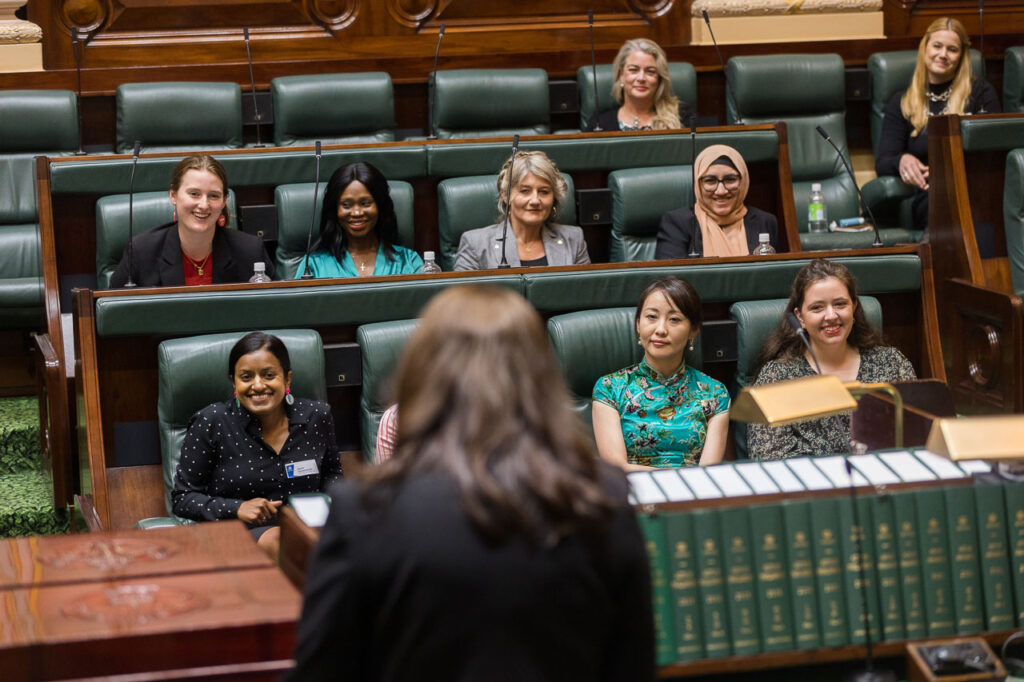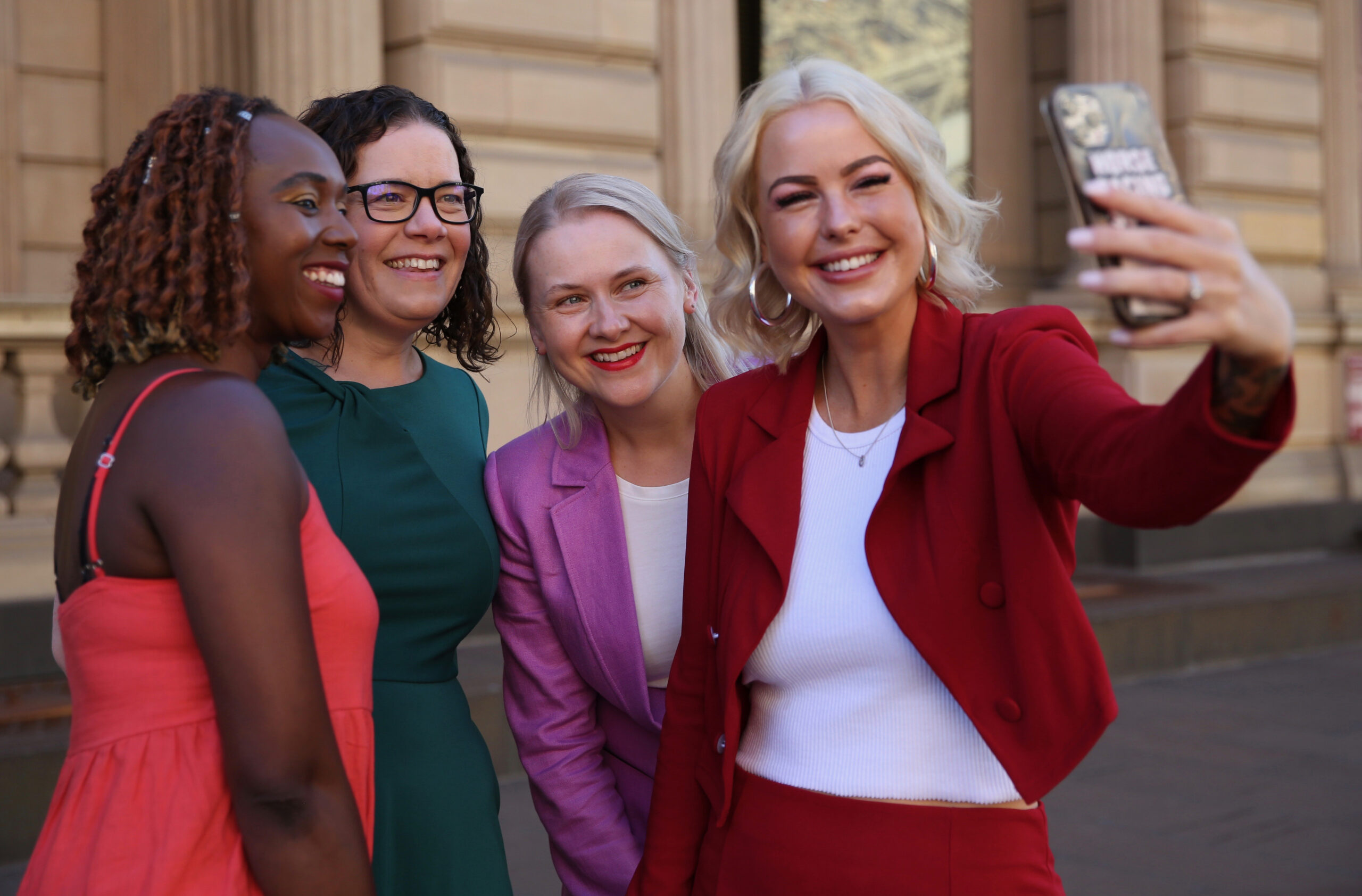The Pathways to Politics Program for Women is a national, proudly non-partisan initiative that aims to change the face of politics by equipping women with the skills, knowledge, confidence and networks they need to run for elected office and thrive as political leaders. Next week, Pathways launches at the University of Canberra, making it the sixth tertiary institution around the country to offer the program.
Dr Meredith Martin is the Pathways Program Director for the University of Melbourne. She worked closely with Carol Schwartz AO to establish the program in 2016 and has played a leadership role in its national expansion. Here she reflects ahead of the exciting Canberra launch .
I was thrilled to get an invitation last week to hear the inaugural speech from Georgie Purcell MP, now the youngest woman in the Victorian Parliament since she was elected to the Legislative Council last November. Georgie is one of six alums from the Pathways to Politics Program for Women, across five different political parties, who won seats at last November’s Victorian state election.
Despite Georgie’s lifelong passion for politics (at nine years old she proudly wrote a song called “Polling Booth Rock”) and the powerful tool it is for creating a kinder, fairer and more just society, she said that becoming a politician was never part of the plan. She felt that women like her, who don’t fit the expected mould of what a politician should look like or act like, would be better off working in the background rather than in public life.
But speaking to the Legislative Council, Georgie said: “Here I stand today, the youngest woman in this Parliament, owning my story, proud of my past and ready for my future. I now know that my experiences bring a unique perspective to this place and the ability to consider matters with kindness, empathy and compassion. What I once perceived as one of my biggest weaknesses I now know is one of my biggest strengths, and with a new generation of women coming into our parliaments, I hope they can look to me and see that their past will never define their future.”
As you can imagine, Georgie’s speech received huge applause, big hugs and congratulations from members across party lines.
I know Georgie through her participation in the Pathways to Politics Program for Women (which I’m Director of at the University of Melbourne) and I couldn’t help but beam with pride at the conclusion of her speech – as I have with many of our elected alums over the years. But more than that, the moment made me feel truly optimistic about the political participation of women in our Australian Parliaments and councils, in leadership roles and decision-making positions.
Pathways to Politics is a national and proudly non-partisan initiative that aims to change the face of politics by equipping women with the skills, knowledge, confidence and networks they need to run for elected office and thrive as political leaders. It is offered free to all selected participants.
The program was established in response to the persistent underrepresentation of women in politics, and initiated through the vision and support of Carol Schwartz AO, Chair of the Trawalla Foundation, who fundamentally believes in the value of more female leaders.
In Australia, women are under-represented across all levels of government, business, civil society, and positions of influence. Despite their proven ability as leaders and their right to participa

Pathways to Politics 2022 cohort participating in the “Speeches in Parliament” exercise. Picture: Supplied
te equally in democratic governance, women still face many obstacles to participating in political life.
We used to be a world leader on women’s representation. In 1902 we became the second country in the world (behind New Zealand) to give women the right to vote. In 1921, Edith Cowan OBE became the first woman elected to an Australian Parliament.
Yet since the International Parliamentary Union started ranking countries by women’s representation in parliament, Australia has been steadily falling down the rankings. In 1997, we were ranked 27 – but we have since fallen to 57thplace as of 2022. In comparison, New Zealand is ranked sixth. While Australia has made modest progress in women’s representation, other nations have taken great strides. As of January 2023, 42% of federal parliamentarians. Women’s participation at state level varies significantly: NSW 34%, Victoria 49%, Queensland 31%, Western Australia 48%, South Australia 35%, Tasmania 52%, ACT 52%, Northern Territory 48%.
Pathways to Politics has proven to have real impact in advancing women’s political participation in Australia. We’ve now seen 28 electoral successes nationally, from all sides of politics and at local, state and federal levels of government.
The program is also growing nationally, helping to equip more women to run for public office. Since founding at the University of Melbourne in 2016, Pathways to Politics has expanded across Australia with partner programs running at QUT, UNSW and Charles Darwin University, and this year we’re thrilled to have the University of Adelaide and University of Canberra joining the family with their inaugural programs for residents of South Australia and ACT. (West Australians and Tasmanians stay tuned – we hope to have more partner programs commencing in the coming years, making the program fully national.)
Bringing Pathways to Politics to South Australia and the ACT is such an important milestone in the growth of the program nationally, and we can’t wait to see the high quality programs the University of Adelaide and University of Canberra will deliver, and indeed the incredibly talented, passionate women from diverse political, social and cultural backgrounds who will no doubt be applying!
Like Georgie, it’s not uncommon for the women who join the program to have some doubts about putting themselves forward to run for office. The term “imposter syndrome” still comes up all too frequently in our workshops. But as former Federal MP and Pathways alum Dr Katie Allen told us, “You cannot be what you cannot see. That’s why the Pathways to Politics program is so important. It provides a window into the experience of those who have been politically successful. We need to change the political conversation and the way to do that is to get more women elected.”
Another of our alums, Cr Tina Samardzija, Deputy Mayor at Monash City Council, told us, “The power of the program for me was normalising the idea of running. With that mental hurdle out of the way, I could focus on building the skills and knowledge I needed to win.”
By providing practical training, mentorship and opportunities to hear first-hand from leading female politicians across the political spectrum, participants say that they get the confidence boost they need to understand that yes, it isnormal to want to run for political office. And they build those all-important networks to support them on their pathway to politics, which endure way beyond the life of the program – I regularly hear from our alums about the connections they’ve made with each other and within the broader political community that continue to provide them with invaluable support and a sense of community as they navigate the challenges of campaigning and political life.
We’re eager to meet our 2023 Pathways to Politics cohorts who are ready to bring their great skills, unique experiences and passion to creating a more diverse and inclusive political landscape in Australia – and to changing the face of politics.
- Applications for the 2023 Pathways to Politics Program for Women open on 6 March. Places are open to women and non-binary residents of Victoria, Queensland, ACT, NSW, South Australia and the Northern Territory. Find out more about the program and apply online at pathwaystopolitics.org.au.
Picture at top: FPathways to Politics alums L-R: Susan Yengi, Sarah Jefford, Cr Tina Samrdzjia (Mayor of Monash City Council), Georgie Purcell MP (Member of the Legislative Council for Northern Victoria). Picture: Supplied
The launch of Pathways to Politics at the University of Canberra is supported by Uni Super.
Dr Meredith Martin is the Program Director for the University of Melbourne’s Pathways to Politics Program for Women. She worked closely with Carol Schwartz AO to establish the program in 2016 and has played a leadership role in its national expansion.





